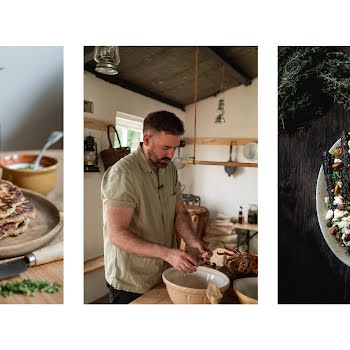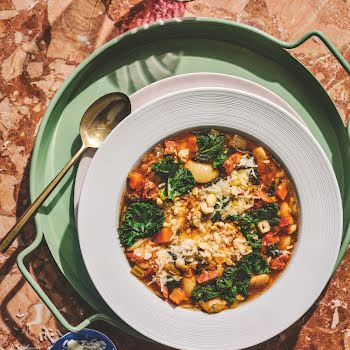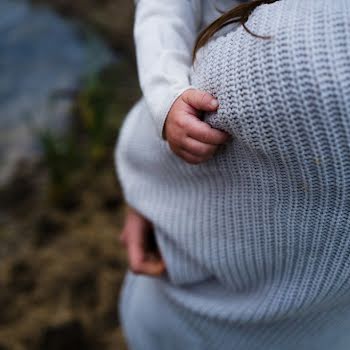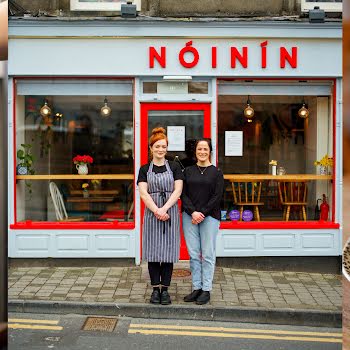
School Meals Scheme: Ballymaloe sauces for some children, “beef of unknown origin” for others
By Lizzie Gore-Grimes
20th May 2024
20th May 2024
While a huge discrepancy between the standards of the hot meal suppliers for the School Meal Scheme emerges, Lizzie Gore-Grimes is heartened to speak to at least one school lunch provider who seems to be doing it right.
“I firmly believe that the introduction of free hot meals (in primary schools) is the biggest, and most positive social movement this country has ever witnessed,” says Ger Killian, MD of Tipperary-based business The Lunch Bag. “This is our opportunity, as a nation, to form positive habits for life. I personally feel, as a mother and as a school meal provider, that we have a real responsibility here. In five to ten years’ time, when people look back at the patterns in Irish childhood obesity and related illnesses, I want them to see that 2024 was the year that pattern began to shift and improve.”
This is fighting talk from a woman involved in the scheme that has been denigrated in the press recently as a misuse of government funds, supplying sub-par “industrial food”, with “dense ingredient lists and eye-watering use of additives and processing aids”. Adding insult to injury the scheme is also accused of providing the children’s food in single-use containers with disposable cutlery, creating tonnes of unwanted additional waste annually. Reading the damning piece recently published in The Irish Times, it was very hard, as a parent, not to feel as enraged and let down by the system as the journalist clearly is.
“We were also so disappointed when we read that piece,” continues Ger, “Based on negative findings of this one small hot-drop model company, a generalisation was made with regards to the entire school meal scheme, which was not fair. No attempt was made to reach out to other suppliers like us.”
Concerned parents
Full disclosure: The Lunch Bag supplies my daughter’s primary school (in Dublin). I was anxious to know if the disappointing findings printed in the newspaper, which included chicken sourced from China, pasta bolognese made with an industrial “pasta meat sauce”, origin of beef not stated, and a menu “almost entirely devoid of vegetables” was also true of their offering.
“We are parents ourselves and passionate that what we do will make a positive impact,” Ger responded. “We vehemently stand over our product, our produce and our people at The Lunch Bag. We’ve just won a Guaranteed Irish award and I’m on first name terms with almost all of our suppliers.”
Food provenance
Ger goes on to list them for me, and it’s impressive. Chicken and turkey from McCaugheys family farm in Castleblayney, pork from Loughnane’s butchers in Galway, beef from McKeowns in Ballymena and cheeses from Bandon Vale in Cork. “We work with Finnegan’s farm in Navan for our veg and Mike Duggan in Limerick for our fruit, which we wash and hand cut ourselves.”
It’s also music to my ears to hear that they work with Ballymaloe Foods for all their sauces. “We are very proud to have teamed up with Maxine and Rose at Ballymaloe who have helped us to create a series of sauces that are low in salt and sugar and full of pulsed vegetables so that we can make sure that each meal contains 80 grams of fresh veg. We also work with the Spice of Life in Cork to make our gravies for us, which are completely MSG-free.
“We add lentils to all of our mince dishes,” Ger continues, “to add an extra, secret, fibre boost for the kids and we work with Glenhaven in Co Wicklow for our chicken goujons, made with 100% chicken breast, baked not flash-fried. Making the meals as nutritionally beneficial as we can, whilst still ensuring they are appealing to the childrens’ palates is extremely important to us.”
Ger has two nutritionists, a dietician and a microbiologist on her team, along with the 200-plus staff, making the meals fresh every day, and a full food safety team.
But what about the environmental concerns? “At the moment, each child’s meal is delivered in a compostable cardboard box, lined with beeswax, made by Donegal company RAP, to be composted in the brown bin. We also supply each child with a BPA-free plastic washable, reusable container (made in Athlone for us by Ross Technologies) to take their leftovers home with them. As we speak, we are working very hard to come up with a system that will eliminate the need for the single-use compostable element, but we will need more time for that.”
Talking to Ger it’s hard not to be impressed by the lengths they are going to. You don’t have to be in the business to guess how much more it costs them to work with the likes of Ballymaloe Foods and provide compostable containers. During our chat, I learned that while her business partner Ray comes from a business background, Ger’s professional background was in social care. “Myself and Ray have a motto: ‘Do the right thing and the right thing will happen.”
Level playing field
What seems abundantly clear here is that there is a huge discrepancy between the standards of the hot meal suppliers, of which there are currently about 10-12 operating within the scheme. The department allocates €3.20 per meal, but seems to take a hands-off approach to how it is spent. Schools are provided with the funds and carry out the tendering process themselves.
But Ger is quick to defend the school principal to whom the onus naturally falls. “The principal of any primary school will almost always want to support a local business and will, understandably, assume the government will have its own checks in place to ensure quality standards are met.”
And while the government does set certain guidelines, published here, it merely states that “Funding under this scheme is for food only, which must be of suitable quality and nutritional value, and prepared and consumed in an appropriate environment. The type and range of meals provided, as well as the method and logistics of supplying the meals, are decided by the individual schools that operate the projects”. This is not enough.
So how can we level the playing field and ensure the scheme is a success for every school? Minister Humphries has made it clear she is determined to roll it out to every primary school in the country by next year, well ahead of the 2030 deadline. All great news, in theory.
Follow through
Nobody is arguing that the idea behind the scheme is flawed. Offering a hot meal for school children is simply taken as a given in schools across the globe – from India to Estonia, and France to Japan, it is simply the norm. It offers untold benefits. Not only does it reduce stress and financial pressure for parents by removing the headache of daily school lunch prep, but it also offers children an opportunity to try new foods and flavours, and most importantly, to sit and properly enjoy a meal together in a social group. It is widely reported to improve cognition, attendance, physical health and mental wellbeing. But all the goodness is bleached out of the above, quite literally, if the food provided is poor.
“The Department (of Social Protection) should have its own team of dietitians and nutritionists working with the school meal providers,” says Ger, when I quiz her on how the flaws in the current scheme could be addressed. “They should be reviewing the full menu and nutritional breakdown of each meal offered by each provider. We also need Irish suppliers to ramp up to meet demand, I have been in touch with Bord Bia on this – we all need to work together.”
The Lunch Bag does seem to be doing the right thing, as their motto suggests, working with Irish suppliers to provide nutritious meals, served in compostable packaging – with a pledge in place to move to a fully reusable solution as soon as they logistically can. But the government needs to be more hands-on.
It seems absurd to set the scheme up, pumping millions into it, and then not follow through with the essential support and oversight needed to ensure it delivers on its promised potential to feed the minds of the future, and mind the planet as they do so.























